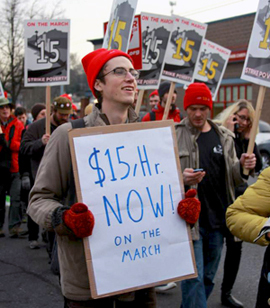Workers rising, wages rising.
That's the story of the summer so far for the American economy and the hard-working women and men staking their claim to join the next American middle class.
The most recent example is the victory in Seattle, where the mayor signed a bill that will boost the minimum wage in the Emerald City to $15. It's a tremendous victory for workers there, but it also sends a message to workers everywhere who have the guts to demand change: You are stronger together. Your community will stand with you. Union members, like those in SEIU, will stand with you. And you will win.
Nothing about what happened in Seattle -- or in nearby SeaTac, Washington, a few months earlier -- is surprising. The economy hasn't been working for most people for years. There just aren't enough good jobs you can raise a family on anymore. How long could corporate bosses turn up the heat on American families before things started to boil over?
National media are taking notice. "[T]heir victory serves as a powerful example to lawmakers elsewhere: 'Seattle did it. Why can't you?'" argued Bloomberg Businessweek. And if lawmakers aren't willing to act, workers are going to take their case straight to the streets, to corporate bosses and to voters.
In fact, that's already happening. Workers are forcing a debate about the future of work and our country:
- McDonald's is on the defensive. Some 2,000 protesters shut down part of the fast-food giant's corporate headquarters for15 an hour and the right to form a union without retaliation. More than 100 fast-food workers were arrested as they committed peaceful civil disobedience in the face of police in riot gear.
I'm reminded of Shareeka Elliott, a mother of two who works nights at New York's Kennedy Airport, cleaning the terminals for less than $8 an hour. In January, Elliott and hundreds of airport workers who are fighting to form a union engaged in the same kind of civil disobedience as the McDonald's workers. And they won: an immediate $1 an hour wage increase, a hike to $10.10 an hour by next year and a paid day off to honor Martin Luther King. Workers rising, wages rising.
While some are standing up on the job, others have taken a page from Seattle's playbook, joining together in their communities to demand higher wages. The city council in Richmond, Calif., yielded to public pressure and voted for a $13 minimum wage, joining local and state governments from Minnesota to Maryland that have raised local pay floors. Supporters of a higher minimum wage in Arkansas have collected thousands of signatures to get an increase on the ballot this fall.
If you work hard, you should make enough to live a good life and provide a better one for your kids. That's a conviction worth fighting for and a sentiment that rings true for most people, not just in Seattle but everywhere. When workers are paid a decent wage, they'll put their dollars to work -- at the grocery store, at the hardware store or buying clothes for the kids. That's how we can get the economy back on track.
From fast food to retail sectors to care workers and security officers, these jobs can and should be at the heart of the next American middle class. They're in the fastest-growing fields and can't be outsourced. These jobs must pay enough to fuel our economy if we want an economy that is the envy of the world, and I think we do. In fact, I think that's why business groups helped shape the $15 an hour minimum wage law in Seattle. They should be commended their forward thinking, but now it's time for their counterparts across the country to do the same.
If CEOs, policymakers and worker organizations sit down and talk in a collaborative manner, they will find distinctively American solutions to the low wages that have dragged down our economy, just as leaders did in Seattle.
But they won't do it on their own. Businesses didn't simply decide to support a higher minimum wage in Seattle. Workers fought for it and earned it. They stuck together, went on strike and made their voices heard. Workers rising came before wages rising.
When we stand together to assert our power over our economy, we cannot fail. We are stronger together. Our community will stand with us. And we will win.

